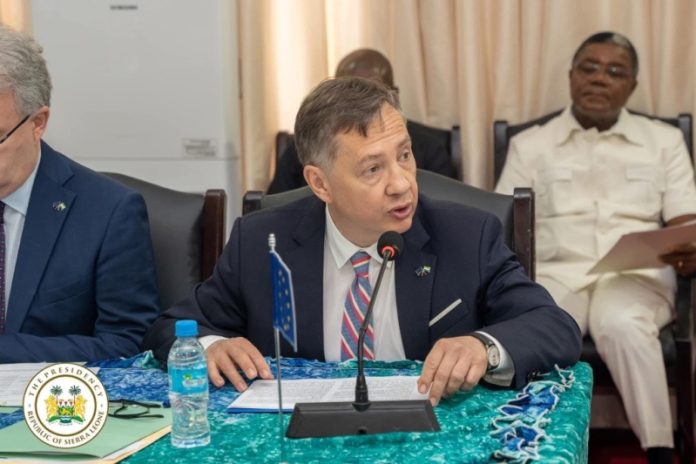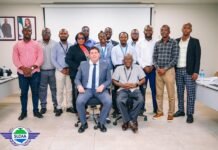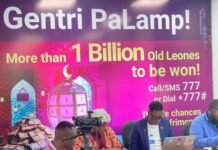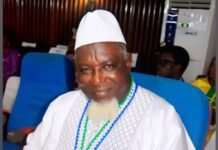By Foday Moriba Conteh
In a significant move aimed at advancing Sierra Leone’s renewable energy sector, the European Union (EU) has pledged EUR 20 million to support the country’s adoption of a Results-Based Financing (RBF) mechanism for the development of solar mini-grids. This initiative seeks to provide access to reliable, sustainable and affordable energy, especially in rural and off-grid communities.
On December 13, 2024, the Government of Sierra Leone reaffirmed its commitment to expanding energy access as part of its national development strategy. To meet the growing demand for electricity in rural areas, the Government is prioritizing renewable energy solutions that leverage the country’s vast solar potential. The RBF approach, supported by the EU, will facilitate the establishment of solar mini-grids expected to electrify 35,000 households.
“The EU funding will support rural development by powering productive use of energy in communities currently lacking access to electricity. This will positively impact the livelihoods of communities. It also reinforces President Bio’s ambition to pursue both bulk power and decentralized renewable energy solutions to power Sierra Leone’s economic development,” said Hon. Dr. Kandeh Yumkella, Energy Sector Lead and Chairman of the Presidential Initiative on Climate Change, Renewable Energy, and Food Security (PI-CREF).
The RBF model provides financial incentives, in the form of grants, to private mini-grid developers and operators based on the number of customer connections they establish. The initiative will be implemented under a multi-partner scheme involving the United Nations Office for Project Services (UNOPS) and Sustainable Energy for All (SEforALL) as key implementing partners. Funding will come from the EU under its EUR 50 million Transformational Energy Access for Sierra Leone financing agreement with the Government of Sierra Leone.
“UNOPS is committed to the collaborative effort required to provide access to sustainable energy for all. In Sierra Leone, we are proud of our record of offering practical solutions to the Government in their drive for clean energy access by helping set up solar mini-grids across the country. We look forward to bringing our operational capacities to further support this work, to deliver on the Sustainable Development Goals and ensure communities can thrive,” emphasized Jorge Moreira da Silva, UNOPS Executive Director and UN Under-Secretary-General.
Damilola Ogunbiyi, CEO and Special Representative of the UN Secretary-General for Sustainable Energy for All, added, “This partnership demonstrates the power of collaboration, clear leadership from Sierra Leone’s Government and innovation to scale clean energy solutions for underserved communities. Importantly, this incentive structure drives economic development by boosting the viability of local companies and the sector, ensuring everyone benefits from electrification.”
The shift to an RBF model builds on earlier successes. Power Leone, a local energy provider, previously established mini-grids in Borup, Kalangba and Kasirie with grant funds from the Universal Energy Facility (UEF), a multi-donor facility aimed at scaling up energy access in Africa. These projects have successfully connected 500 households, demonstrating the viability of the RBF approach.
“The use of Results-Based Financing for the rollout of solar mini-grids is an important step for Sierra Leone. As the RBF mechanism is scalable, it has the potential to lead to a palpable acceleration in rural electrification. We would be very happy to see other donor partners of Sierra Leone join the European Union in supporting the Government’s initiative,” remarked Jacek Jankowski, EU Ambassador to Sierra Leone.
According to the Ministry of Energy’s National Online Database for Electrification (NODE), Sierra Leone has identified 703 potential sites for mini-grid development, in addition to the 104 mini-grids currently in operation. These additional mini-grids are expected to provide electricity to approximately 180,000 households. The EU’s RBF grant will support about 20% of these additional customer connections.
The Government of Sierra Leone has taken proactive measures to strengthen policies and regulations to create a conducive environment for private sector participation in the energy sector. Key measures include the Sierra Leone Renewable Energy Policy of 2016, which formalized the role of mini-grids in rural electrification. In 2016 and 2017, duty waivers and Value Added Tax (VAT) exemptions were introduced for imported quality-certified (IEC-compliant) solar products. Although these incentives were suspended in 2022, they will be reinstated in 2025.
Another critical development is the Mini-Grid Regulation adopted in 2019, which provides a clear framework for licensing, tariff setting, and service quality assurance for mini-grid operators. Efforts are underway to update the Sierra Leone Electricity and Water Regulatory Commission (SLEWRC) Act and refine the Mini-Grid Regulation to attract more private sector investment. Building on experience, SLEWRC, with support from SEforALL, has introduced an enhanced Multi-Year Tariff Order (MYTO2) to provide greater transparency and fairness in energy pricing.
Dr. Eldred Tunde Taylor, Deputy Minister of Energy 1, highlighted the broader impact of the initiative, stating, “Sierra Leone is advancing its energy future through innovative partnerships and sustainable solutions. With the Results-Based Financing mechanism, we are not just powering homes but empowering communities and driving economic growth.”
The Government of Sierra Leone and the EU are currently developing guidelines for private sector operators and development partners interested in accessing the RBF grant funds. The selection process for mini-grid developers and operators will be competitive. Successful bidders will finance, build, own, and operate mini-grids, with RBF grants disbursed upon verification of the completion of pre-agreed milestones.
Several development partners have expressed interest in supporting Sierra Leone’s RBF initiative for solar mini-grids, with the Government keen to attract additional investment from donor partners.
The Presidential Initiative on Climate Change, Renewable Energy, and Food Security (PI-CREF) plays a pivotal role in guiding Sierra Leone’s climate agenda. It aims to address the impacts of climate change, ensure universal access to sustainable energy, and enhance food and nutrition security.
The European Union and its Member States support Sierra Leone’s transition to a sustainable energy future. Through its Development Partnership and the Multiannual Indicative Programme for 2021-2027, the EU prioritizes access to affordable, reliable, and modern energy services. This initiative aims to drive inclusive economic growth, create decent jobs, and promote sustainable energy adoption, thereby fostering a green economy across Sierra Leone.
Sustainable Energy for All (SEforALL) is an independent organization with a global mandate to accelerate energy access in developing countries. SEforALL collaborates with governments and partners worldwide to end energy poverty, promote renewable energy, and tackle climate change. Learn more at www.SEforALL.org.
UNOPS supports sustainable development by providing project management, infrastructure, and procurement services. It works with the United Nations, governments, and other partners to deliver sustainable, high-impact projects efficiently. UNOPS has played a key role in advancing Sierra Leone’s clean energy agenda, particularly in facilitating the development of solar mini-grids.
This significant partnership, backed by the European Union, is set to transform Sierra Leone’s energy landscape, fostering rural development, driving economic growth, and bringing clean, renewable energy to thousands of underserved communities.




